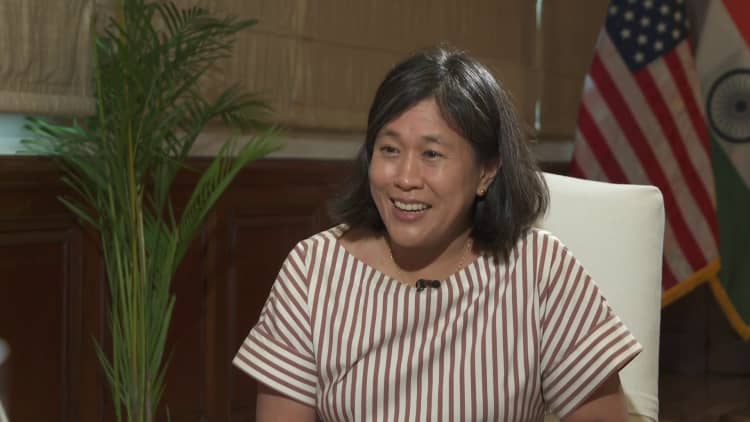U.S. Commerce Secretary Gina Raimondo (L) and Chinese Vice Premier He Lifeng pose for photographs before their meeting at the Great Hall of the People in Beijing on August 29, 2023.
Andy Wong | Afp | Getty Images
BEIJING — U.S. Commerce Secretary Gina Raimondo has left Beijing with a few deliverables: plans for formal discussions on export controls and tourism.
“Now it’s more than just agreements to keep talking. It’s a specific channel to address commercial issues,” Raimondo told reporters late Tuesday as she was leaving the capital city for Shanghai.
“I hope that this becomes a moment where we start to see action.”
In her two days in Beijing, Raimondo met with Premier Li Qiang, Vice Premier He Lifeng, Commerce Minister Wang Wentao and Minister of Culture and Tourism Hu Heping.
Here’s what they agreed to do, according to public announcements:
- Establish a commercial issues working group between the commerce departments — meet twice a year at the vice minister level, and once at the minister level. The U.S. will host the first meeting in early 2024.
- Launch export control enforcement information exchange — first in-person meeting held at the assistant secretary level at the Ministry of Commerce in Beijing on Tuesday.
- Hold the 14th China-U.S. Tourism Leadership in China in the first half of 2024.
- Convene experts from both sides for technical discussions about protecting trade secrets during administrative licensing proceedings.
- Informal discussions as frequently as needed between Wang and Raimondo.
“This is a very important visit because we had no active senior commercial dialogue,” U.S. Ambassador to China Nicholas Burns told reporters late Tuesday. He noted that in his first 15 months in China as ambassador, there were no U.S. discussions at a senior level with Chinese officials.

There was “no way to deliver really tough messages, no way to listen and provide some context for why they’re making decisions,” Burns said. “In a very, very challenging relationship intensive diplomacy is critical.”
Raimondo’s visit marks the latest in a series of renewed high-level U.S. official trips to China this summer amid a tense bilateral relationship.
“China and the U.S. agree to continue to maintain communication, and support practical cooperation between businesses from both countries,” according to a CNBC translation of the Chinese-language readout of Raimondo’s meeting with Vice Premier He, who is also the Chinese leader on China-U.S. trade and economic affairs.
We don’t negotiate on matters of national security.
Gina Raimondo
U.S. Commerce Secretary
The brief readout of the meeting also said the Chinese side raised concerns about U.S. tariffs, export controls on China, investment restrictions and other measures.
Raimondo said she “said no” to China’s requests to reduce export controls and “retract” the executive order on outbound investment screening.
“We don’t negotiate on matters of national security,” she said.
Earlier this month, U.S. President Joe Biden signed an executive order aimed at restricting U.S. investments into Chinese semiconductor, quantum computing and artificial intelligence companies over national security concerns. Treasury Secretary Janet Yellen is mostly responsible for determining the details.
Forthcoming implementation remains in a period of public comment.
In the fall of 2022, the U.S. Department of Commerce’s Bureau of Industry and Security announced new export controls that limited the ability of Chinese businesses to buy certain advanced semiconductors from American suppliers.
This summer, China’s Ministry of Commerce announced its own export controls to restrict Chinese exports of two metals — gallium and germanium that are used in semiconductor manufacturing.
An unstable economic relationship between China and the United States is bad for the world.
Gina Raimondo
U.S. Commerce Secretary
Raimondo noted that about 1% of U.S.-China trade is subject to export controls.
“An unstable economic relationship between China and the United States is bad for the world,” she said.
However, she said her conversations with more than 100 businesses around this trip found that doing business in China was getting harder with greater uncertainty surrounding new laws.
“Increasingly I hear from businesses China is uninvestible because it’s become too risky,” she said.
China has doubled down on efforts to promote investment in China this year, and rolled out initiatives to boost such inflows.
“Any one of those could be addressed as a way to show action,” Raimondo told reporters.
In Shanghai, her itinerary includes a meeting with the local party secretary and Shanghai Disney.
The theme park saw record high revenue, operating income and margin during the latest quarter, the Disney said in an earnings call.
— CNBC’s Eunice Yoon contributed to this report.

